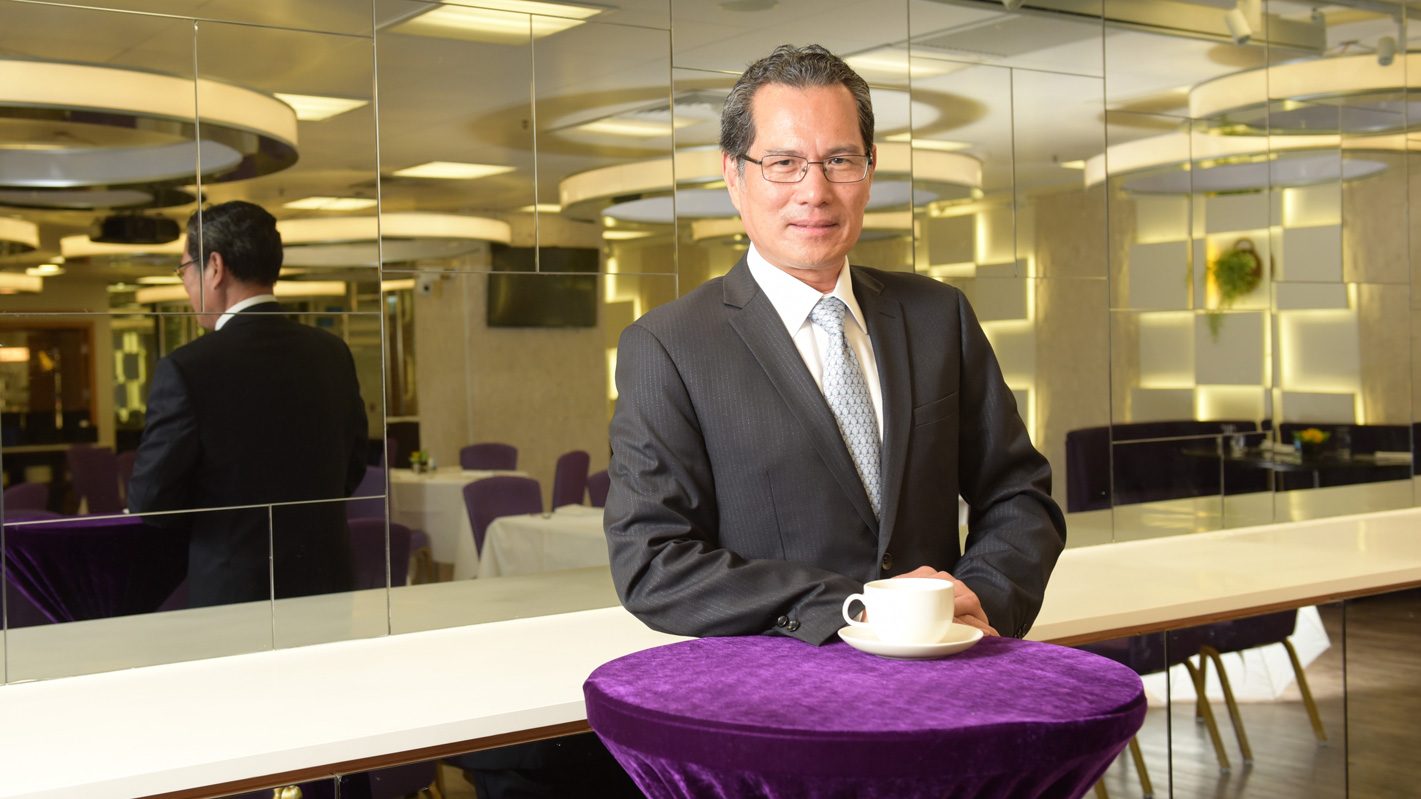David Chan’s Journey from Hotel to School

With over 30 years’ experience in the hotel industry, Prof. David Chan is well versed in all aspects of hotel management and possesses a profound knowledge of latest industry trends. He joined CUHK Business School as a Professor and the Director of School of Hotel and Tourism Management in 2018.
Why did you join the University after working in the hotel sector for more than 30 years?
I’d worked for world-leading hotel groups like the Peninsula, Regent, Marriott and Hyatt in the US, Australia, Mainland China and Hong Kong, as general manager for more than 20 years and district vice-president for five years, and dealt with different landlords and guests. Hotel is both a service industry and a complex business which requires administrators of high calibre. Over the years, I have come across numerous cases, both successful and extremely challenging ones. It will be meaningful if I could share my experience with the staff and students of the School and provide professional training for the young generation.
How does your School set out to train its students?
Service is the crux of the hospitality industry. But as a business, it cannot be sustained if it’s not making profits. The objective of our BBA Programme in Hospitality and Real Estate is clear: we go beyond management to cover the entire business operation with a focus on the relationship between hospitality and real estate. In the long run, we aim at nurturing our students to be leaders in various professions, with substantial knowledge in resource deployment for projects on different scales. Our programme includes 900 hours of practicum to equip the students with enough frontline experience before graduation, which will be vital for facing future challenges in the hospitality and real estate fields, and for developing their entrepreneurial potentials.
What does the future hold for the hotel and tourism industry?
The opening of the Hong Kong-Zhuhai-Macao Bridge will accelerate the movements of people and goods. Plus the Belt and Road Initiative, the demand for hotel accommodation can only increase. Putting Hong Kong within the wider context of the Greater Bay Area, and considering its accompanying infrastructural developments and policies, I must say that the future looks really rosy. Hong Kong’s excellent management quality makes the city in hot demand from the Belt and Road countries. In the next three years, China, Hong Kong and Macao will see the establishment of over 1,000 hotels of different niches. The Greater China region has a high demand for talent in the industry, and our graduates will therefore enjoy ample opportunities for career development.

Prof. David Chan, Professor and Director of School of Hotel and Tourism Management
What is the impact of the Internet on the hotel and tourism industry?
The changes are revolutionary. In the past, we had to go through six or seven steps from reservation to checking-in. Today, it’s just one click on the Internet. The rise of Airbnb has made our competitors even more numerous, and room rental websites are now all the rage. Hoteliers are thinking hard about the reason why most customers prefer not to book with the hotels directly. In addition to the differences in choice, price, and terms, the unfashionable and unfriendly designs of many hotel websites also make booking cumbersome. In this e-commerce era, young people no longer pay with cash or credit card.
All challenges come in two faces—crises and opportunities. The Internet collects loads of data about the backgrounds and preferences of customers, making customised services possible. Luxury hotels with a small market niche are especially reliant on such client-tailored services. A room booked by a female customer must be fitted with facilities suitable for women; elderly customers should be assigned rooms closer to the elevator and never a table tucked away in a corner of the restaurant. Give your customer an occasional surprise. But never celebrate ahead the birthday of a German customer, because Germans consider that bad luck.
Are there any cultural differences within the hotel industry?
My PhD thesis was on the localisation of senior management in international luxury hotels. I have witnessed how some international hotels, by adhering to the western model of management, overlooked the oriental way of handling things and doing business, as well as the culinary habits of local customers. Handling cultural differences is like holding an egg: if you hold it too tightly, the egg will crack; but if you don’t hold it tightly enough, it will fall. There should be a balance between occidental discipline and oriental ease. Generally speaking, I think the East is better than the West when it comes to the provision of sophisticated services.
How are your professional knowledge and exposure influencing your travel experience?
I must admit that I have been spoiled by my experience working in five-star hotels, which makes me very particular with what a hotel offers in terms of ambience, cleanliness, logistics and efficiency. I am old-school, and won’t take risk in staying in a budget hotel because I know I won’t be greeted by smiling faces upon arrival, and that the services will fall short of my expectations. I am obsessed with details. Things like a carpet stain or the smell of cigarette on the wallpaper can never escape my attention and will all make me feel uneasy. Having worked so hard for decades, I think I deserve some pampering. I’d rather spend 30 to 50% more in exchange for what I consider real service. So if you ask whether I’ve ever tried Airbnb, the answer is no.
This article was originally published in No. 517, CUHK Newsletter on 4 May 2018.

